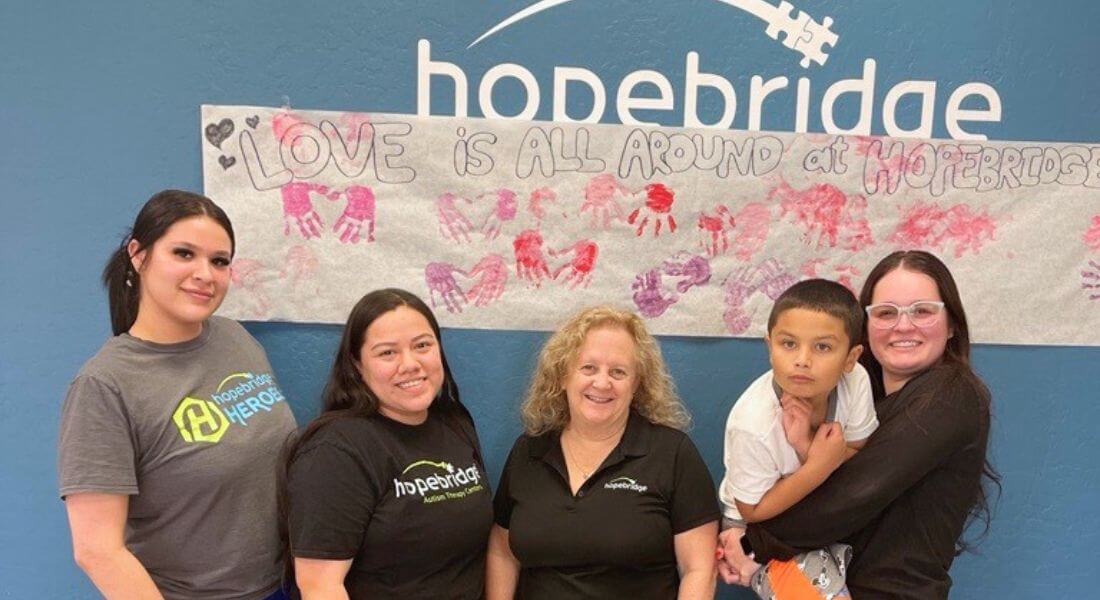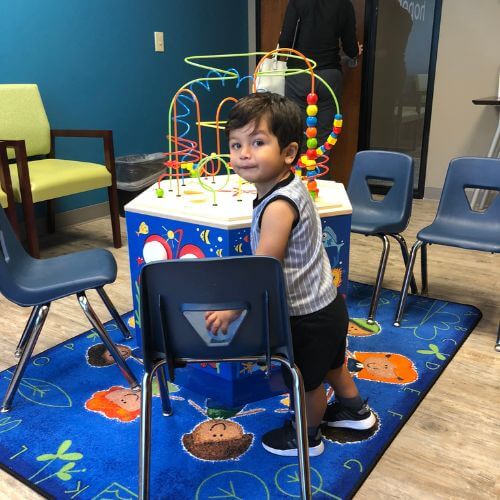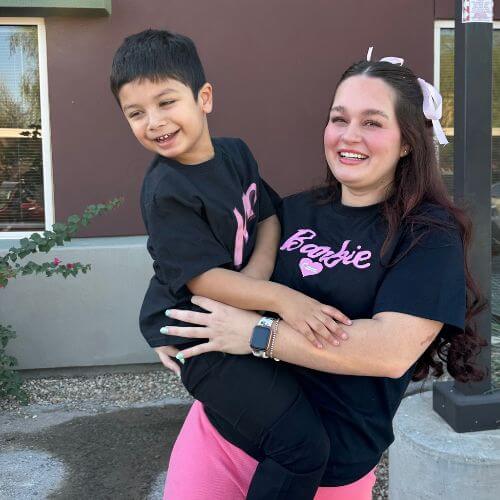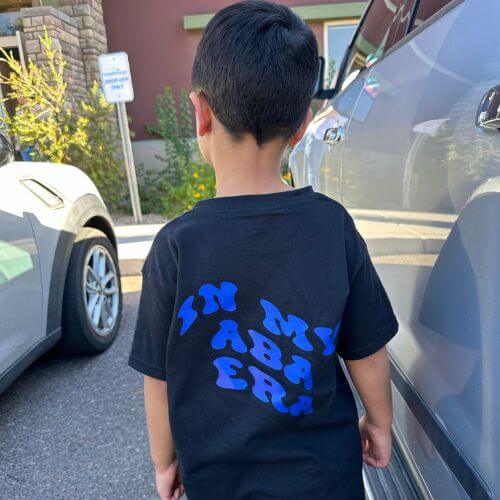Hopebridge’s First-Ever Arizona Patient Graduates from ABA Therapy
August 19, 2024
August 19, 2024

A child’s first day of autism therapy is an exciting day. The family may feel a little anxious to start something new, but there is also hope for the future, especially for those who have been waiting for answers.

Cameron was the first Hopebridge kiddo in the state of Arizona.
When Hopebridge patient, Cameron, started applied behavior analysis (ABA therapy) at the autism therapy center in Glendale, AZ, the anticipation was great. Starting therapy a few months before his second birthday, it would be the first time Cameron would spend his days away from his parents. And as the provider’s first Arizona patient, it was not only his first day with Hopebridge, but also that of his Board Certified Behavior Analyst (BCBA), Dawna Sterner.
Much has changed since that first day. Now, nearly five years later, Dawna is still supporting Cameron as he is about to embark on another exciting journey: school! He graduated from Hopebridge and will head into the classroom for the first time.
Since receiving his autism spectrum disorder (ASD) diagnosis and starting ABA therapy at Hopebridge, Cameron has learned and grown so much. Dawna and the rest of his therapy team have prepared him for the classroom, giving him the tools to thrive and watching his confidence soar. We had the chance to sit down with his mother, Paulina, and some of his clinicians to share Cameron’s inspiring story for other families who may be considering similar paths for their children.
Cameron is the type of kid everyone loves to have as a friend. He is a silly, happy 6-year-old, yet he’s also a caring big brother who cries when he sees his younger sisters cry. He loves books, the water and all-things-Mickey Mouse—even toting his own Mickey Mouse flash cards around the center, now attending therapy in Litchfield Park. He is quick to show his adoration for those around him and has built strong connections with his Registered Behavior Technicians (RBT) over the years. Cameron is incredibly social, but this was not always the case.
When Cameron was about 15 months old, his parents, Paulina and Michael, already presumed he had autism. He made eye contact, but did not wave, respond to his name, nor respond to demands. Though he was still young, his parents noticed he babbled but eventually regressed to vocalizing sounds rather than progressing to words. In addition to what they noticed regarding his communication, he stimmed through hand-flapping and walked on his tiptoes.
Paulina and Michael spoke to Cameron’s pediatrician about his development, and following his autism screening at 18 months old, they felt it was clear they should pursue a diagnostic evaluation. The physician referred them to Hopebridge, which was new to Arizona at the time, where Cameron was diagnosed with ASD at 20 months old.
He started ABA therapy at Hopebridge about a month later. It did not take long for Cameron to get acclimated to the center and start honing his skills, even as the number of patients and clinicians at the center grew.
“Cameron has always been ready to go to therapy. He will wake early, grab is backpack and be ready to go, even before it’s time to leave!” said Paulina.
From the start, Cameron’s primary goals were focused on communication and play.
Waving was one of the first communication skills Dawna and the team worked on with Cameron. This was a huge milestone for him, but it was how quickly he was able to communicate through Picture Exchange Communication System (PECS) that caught Dawna’s attention. They immediately began personalizing the tool for him, incorporating pictures of his lunch box (he loves to eat!) and his other preferences.
“Cameron is a smart communicator and mastered PECS at a young age. He had something to say and wanted to get his point across,” said Dawna. “He understands PECS is an extension of his voice.”
More recently, Cameron began using a new form of augmentative and alternative communication (AAC), an ONcomm device. Once again, he took to it right away with relatively little training.
“Cameron is a realist and once he understands something is useful, he will continue with it. I taught him to give me a thumbs up if he’s willing to try something, and usually once I explain what we’re ready to do and why it is important, I’ll get the thumbs up,” said Dawna.
Paulina told us that while Cameron is non-speaking, this new AAC device has given him even more support in communicating his needs, sharing his feelings and requesting toys. He uses it to advocate for himself with phrases like, “I’m done with that” and “I’m hungry.”
“When he was first diagnosed, I wasn’t sure he’d ever be able to understand us, but now he picks up on everything and also can tell us how he feels,” said Paulina.

Hopebridge staff work to bond with kiddos like Cameron.
When Cameron first began using his new device, his mom added photos of his therapy team, including Hopebridge Fellow Alena Wieczorek, who previously served as his RBT and still assists Dawna on his case. Paulina said she was one of the first people she added to the device because of how much he cares for her.
Alena vividly remembers sitting in a meeting with some of the leadership team when she overheard Cameron in another room use his device to say, “I want play Alena.”
“I immediately bolted out of the meeting to play with him! As soon as we heard it, the whole staff was so excited,” said Alena. “He was still in the early stages of learning how to use the device and needed to go through several categories to create this sentence, so it was a big deal.”

Hopebridge is excited for Cameron to graduate from his “ABA Era” to his “School Era.”
This fall, Cameron will transition out of ABA therapy and enter first grade. His parents feel much more comfortable sending him to school now that his communication skills have flourished, in addition to a great deal of other skills that will prove useful in the classroom.
Cameron follows directions and cooperates with others. Dawna told us he’s a great peer model, often teaching other kids how to take turns. He has overcome motor deficits, learning to successfully use pencils and take part in arts and crafts. Cameron also has a good foundation for academics, including reading skills.
The Litchfield Center also has a “School Crew” Cameron participates in, which is essentially a mock classroom for children to practice transitions, working alongside peers and other school readiness skills. Goals include following a group schedule and responding to multiple instructors, besides their regular one-on-one time with their therapists.
Cameron’s parents and therapy team all believe he is ready for school, so he will graduate from Hopebridge at the end of July alongside a group of his peers. Paulina told us that before deciding to make this transition, it was important that she talk to Hopebridge and know that his BCBA feels he is prepared to move on, too.
“I don’t know if I’m ready for him to go to school – it’s hard to leave the place that has become his second home! – but I know he is ready,” said Paulina. “Hopebridge has been working on preparing him and it helps me to know Dawna agrees.”
Cameron has achieved so much during his time at Hopebridge, but his mom knows this is not the end of his learning—it’s just the start! Now that he has mastered his foundational skills, she looks forward to his continued growth and watching his social communication improve. Above all, she wishes for him to be happy.
If your child has autism or other developmental delays and could use more assistance in preparing for school or other life events, don’t wait to seek support. At Hopebridge, we offer services like diagnostic evaluations, ABA, occupational therapy and speech therapy that can be personalized to your child’s specific needs and strengths. Reach out to us to give your child the tools to live their best life possible.
*Informed consent was obtained from the participants in this article. This information should not be captured and reused without express permission from Hopebridge, LLC.
Kiddo Spotlight
July 23, 2020
Autism Mom Helped Two Sons Shine Through ABA Therapy During COVID-19
Kiddo Spotlight
March 03, 2022
Moving on From ABA Therapy and Into the Classroom: Santino Loves Going to School
Kiddo Spotlight
October 07, 2018
Hopebridge Mother Shares Story After Two Sons Receive Autism Diagnosis